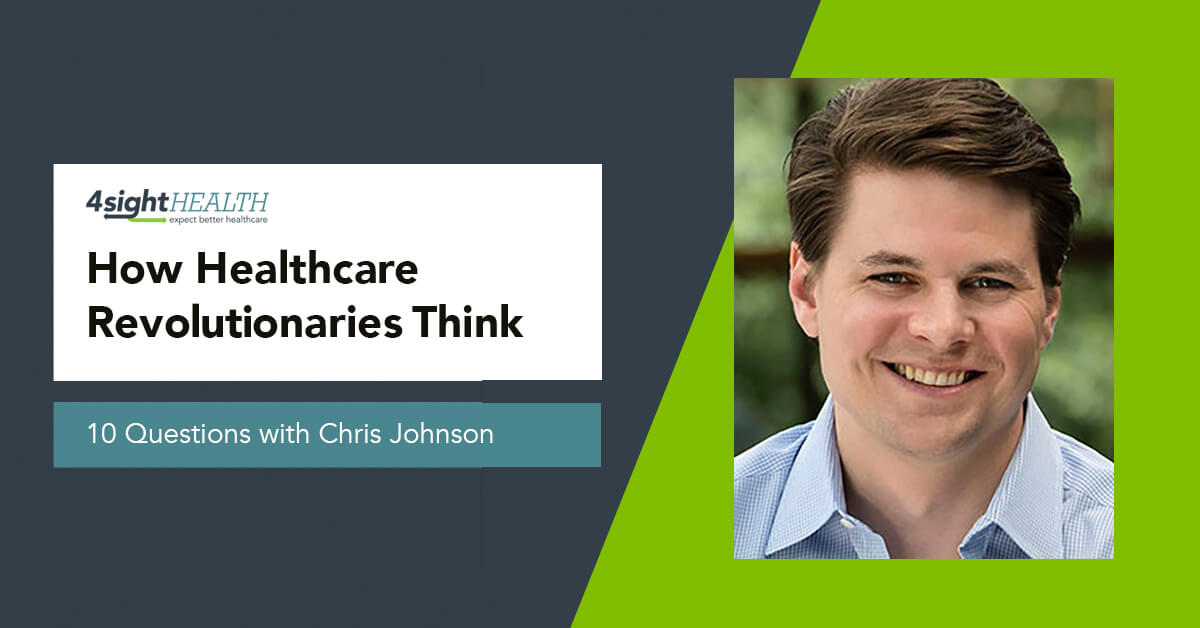March 12, 2024

How Healthcare Revolutionaries Think: 10 Questions with Chris Johnson
Welcome to the latest installment of 4sight Health’s series, How Healthcare Revolutionaries Think. Our interview series profiles healthcare instigators who believe that outcomes matter, customers count and value rules.
Chris Johnson is an unemployed healthcare innovator. By choice.
Don’t feel sorry for him. He’s got his bachelor’s in economics and his master’s in business from Harvard. He’s founded, sold and/or worked for some of the most recognized healthcare companies, organizations and leaders in the industry. Today, he’s continuing his quest to build the greatest clinical organization in healthcare. An organization that produces the best possible outcomes for patients. An organization that creates the best possible work environment for clinicians. And an organization that generates a healthy profit for its owners or shareholders because it does those first two things well.
I spoke to Johnson about how his thinking about healthcare evolved and how data influenced each step on that evolutionary ladder. You also can listen to my podcast interview with Johnson on why we should stop calling it chronic disease management and start providing more preventive care in the home.
1. Chris, let’s start with the question that I ask everyone in this series. Give me your definition of a healthcare revolutionary.
Johnson: A revolutionary in healthcare is willing to look at the way that the market is structured and challenge that status quo in a meaningful way. That’s not a profound answer. But of all industries, in healthcare, it’s a small number of constituents that drives much of what we perceive as hard and fast rules — rules that are self-reinforcing to legacy business models and financial interests. Those rules are not always aligned with what most people believe healthcare should be, and that’s be accountable to patients. Healthcare revolutionaries challenge those orthodoxies and build models that make patients and outcomes the north star, regardless of how we structured an industry 10, 20, 30 years ago.
2. The key word in your definition is “meaningful.” A lot of people say they want to change things. But it’s change that helps them more than others. Given your definition, who is your favorite healthcare revolutionary, past or present?
Johnson: There isn’t one I’d circle on my page and say, “Hey, this is the person.” There are lots of people who’ve done really revolutionary things, especially over the last 15, 20 years in healthcare. I’m grateful I got to be part of Landmark Health, founded by Adam Boehler and Vinay Mascarenhas, who challenged the way we deliver primary care and how we care for seniors. I’m very grateful for that. Stepping back, we’ve been very good on the scientific side of challenging the way that we practice medicine. We’ve been less accepting of challenging the way that we deliver healthcare. We need more smart thinkers to continue to challenge that status quo.
3. Do you consider yourself a healthcare revolutionary?
Johnson: I don’t know if I’m a revolutionary, but what brought me to healthcare were opportunities to improve the experience for patients and for providers. What we’ve optimized over the past decades has been from a financial perspective, often at the expense of patients and providers, candidly. That’s where I’ve focused my time and energy — figuring out how you can you build a great organization that optimizes the patient experience and provider experience. How we can achieve better outcomes for patients and create great work environments for staff while at the same time be a profitable business that generates the returns necessary to substantiate investment.
 4. That’s really the Triple Crown. Good patient outcomes, a great work environment that can produce those outcomes, and the ability to turn a profit. That’s quite a challenge. How about we put you down as an aspiring healthcare revolutionary? Would that be fair?
4. That’s really the Triple Crown. Good patient outcomes, a great work environment that can produce those outcomes, and the ability to turn a profit. That’s quite a challenge. How about we put you down as an aspiring healthcare revolutionary? Would that be fair?
Johnson: Sure, that works. That works.
5. You’re a data guy. You founded an advanced healthcare analytics company called Predilytics in 2011, which Welltock acquired in 2015. How does data fit into your plans to build a company that produces great outcomes, offers a great work environment for clinicians and turns an enviable profit for owners and investors?
Johnson: The idea was that when the ACA passed and the HITECH Act passed, you were about to see a lot of digitization of healthcare. Everyone’s being mandated to adopt electronic medical records (EMRs). There was a promise at the time — or hope at that time — that EMRs wouldn’t just become sophisticated revenue cycle tools. That they would connect healthcare, and there would be more structured data.
It followed then, that if you wanted to improve overall population health, from a business perspective, you would now have the data to do that. You have the data, and you would use that data to understand where you should disproportionately invest resources to drive better outcomes. That is typically not the way that healthcare has operated.
If you’re a clinician, the time that you spend with your patient who’s sitting across from you in the exam room is sacred. Same with the next patient, and then the next patient. You’re thinking about one patient at a time. You’re not thinking, “Hey, I wonder what’s going on with the other 1,999 patients in my panel right now?” That’s just not how medicine had been practiced historically.
6. You can’t improve what you can’t measure, right? Now you can measure it with all this data. So, what happened? Predilytics lasted only four years before you sold it.
Johnson: We thought there would be this fast transition to accountable care, to value-based care. You’d see alignment between financial incentives and clinical outcomes with the delivery system rewarding the best clinical outcomes. We thought that a data infrastructure would be required for that to happen. We founded Predilytics on the notion that you need data to drive the best possible clinical outcomes. That infrastructure didn’t exist. And, for the first time, there was access to a lot of large data sets.
We were right, but we got a few things wrong. The data was there. The talented team was in place. We were able to leverage technologies from other industries to manage large data sets. We could generate a lot of insights off those data sets. But we were ahead of our time. The transition to accountable care and to value-based care has been anything but fast. We didn’t have much of an audience. We really just built a data company. And it’s hard to be just a data company and change the way that healthcare is delivered.
7. Lessons learned. How did that experience carry over into your next adventure at Landmark Health?
Johnson: It’s why, when I had the opportunity to join Landmark Health, which is a provider organization designed to deliver value-based care, it was so compelling. You could align the providers’ incentives. You could work the data that we generated into the clinical workflows to change how clinicians practice. If you’re just providing data, it gets lost or used for the lowest-hanging fruit. Simple risk adjustment is low-hanging fruit. You must be able to use the data as it was intended — to improve clinical outcomes.
That was important because we took on contracts with both upside and downside risk. We would build local interdisciplinary care teams led by physicians, mostly geriatricians, but they included nurses, nurse practitioners, care managers, clinical pharmacists, behavioral health nurses, community health workers and dieticians. We were able to provide longitudinal primary care to patients in their homes with 24/7 access to urgent care. All because of the data.
A decade ago, predictive analytics in healthcare was a nascent field. When I got to Landmark, we used it. That was the big “aha” moment for me. We actually changed the way that care was delivered. That was the original idea at Predilytics. You really need to integrate data into how you deliver care.
8. You joined Landmark in 2017. Optum bought Landmark in 2021. And you left Landmark two years later in late 2023. We all know Optum is the 800-pound gorilla of healthcare. What was the good and bad of that situation, and how did it change how you think about healthcare?
Johnson: I ran corporate development when we sold to Optum, and one of the challenges that we were always trying to work through was if a customer health plan decided to terminate a contract with us. All of a sudden, our patients — their members — would no longer have access to the services that we offered. They would be cut off. Our providers were very uncomfortable with that. We as an organization hated it. If a health plan left us, we had these super mission-aligned folks who we didn’t have patients to care for. We’d have to wind back a market. The renewal cycles always were very stressful for everyone. Being able to partner with a big organization like Optum allowed us to align where we would grow and our ability to make longitudinal commitments to patients that was less reliant on contract renewals. It also provided a longitudinal commitment and stability to our care teams as well.
Working for Optum was my big company experience. We had about 1,500 people working for Landmark when we sold. Optum has more than 200,000 employees around the world. It’s a size and a scale that is almost unfathomable from a corporate perspective. It’s different. You have to do your job within a huge corporate infrastructure. Things certainly change. You’re arguing for resources. For Optum, the challenge is how do you take the capabilities of Landmark and of all the other organizations Optum has acquired over the past decade and integrate them into one, common Optum health capability. The leaders there are doing hard work. And there are lots of hard decisions that need to be made as you do that. You don’t want to break what was unique about some of these organizations when they were separate. There are lots of special things that have come in, so there are lots of special things that need to be protected. Then over time what felt special may not be within the context of Optum. Things will have to evolve.
9. Between Predilytics and Landmark you worked at Innosight, the management consulting firm founded by the late Clayton Christensen of disruptive innovation fame. Huron Consulting acquired Innosight in February 2017. You left four months later. How did nearly five years at Innosight shape how you think about healthcare?
Johnson: I learned a few things at Innosight. They were certainly all of Clay’s theories. He was a brilliant thinker. Of all that I learned, the three biggest were, first, healthcare. I had no idea what the healthcare industry was really all about. It happened to be one of the industries that they focused on and Clay had done a lot of research on. I started to see where things were crazy, why they are doing the same things the same way and where there were opportunities to improve.
Second, working there was almost like an extension of a liberal arts education in terms of being able to think through really complex, ambiguous problems. A lot of consulting comes down to like, “Hey, we fill in templates.” But in true strategy, there aren’t any templates to work through different macro strategic questions. It taught me how to be comfortable in ambiguous situations and come up with different types of strategies that weren’t simply rinse and repeat what you did in the previous three engagements.
Third was storytelling. I can’t claim to be a great storyteller. Maybe our conversation would suggest that I’m not that great a storyteller. But I learned the power of storytelling as a communication tool you can use to distill complex thoughts into words and pictures that people understand, relate to and remember.
10. You’re a good storyteller. Tell me the story of what you’re going to do next. And tell me if you’re a serial entrepreneur.
Johnson: I don’t know if I’m a serial entrepreneur or just passionate about changing the way we deliver healthcare. I guess that would make me an entrepreneur. I don’t think of myself as a serial entrepreneur, I guess. I just want to build great clinical organizations.
We haven’t gone public with what we’re working on. All I can say is it’s focused on the pediatrics space.
Burda’s Final Bit
As the author of this series, I’m always looking for little clues that will tell me and you about who these healthcare revolutionaries really are and how they think differently from most people who say they are trying to fix healthcare. Here are two clues that will tell you that Chris Johnson is who he says he is. My original interview with him was scheduled for Feb. 6, 2024. He called me at the last minute to reschedule because he had to interview someone for a senior position at his new venture.
Interviewing a person for a position that will be critical to his new venture’s fulfilling its promise to improve outcomes for pediatric patients was more important than a little free publicity for himself through this profile. Second, when I did talk to him on Feb. 12, 2024, I still thought he worked at Landmark. He left Landmark three months earlier but didn’t update his LinkedIn profile. It clearly is not important, and he doesn’t have time as he’s on to his next big swing at making the healthcare system work better for its customers. Johnson has his priorities straight. How many healthcare executives can you say that about?
Chris Johnson is a healthcare revolutionary with specialties in innovation strategy, healthcare IT, healthcare services, payor/provider challenges and medical devices.
Read more interviews with healthcare revolutionaries
Healthcare Revolutionary Ramona Wallace, D.O.
Healthcare Revolutionary Alejandro Quiroga, M.D.
Healthcare Revolutionary Samir Goel
Healthcare Revolutionary Marcus Whitney
Healthcare Revolutionary Demi Radeva
Healthcare Revolutionary Michael Pitt, M.D.
Healthcare Revolutionary Rebeckah Orton
Healthcare Revolutionary Dan Trigub
Healthcare Revolutionary Bruce Brandes
Healthcare Revolutionary Lena Chaihorsky
Healthcare Revolutionary David Nash, M.D.
Healthcare Revolutionary Esther Dyson
Healthcare Revolutionary Meghan Conroy
See if your favorites are included in the series and let 4sight Health’s David Burda know who you consider to be a Healthcare Revolutionary.






